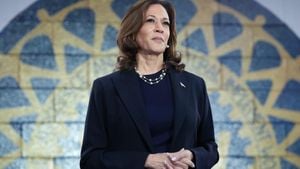With just one week left until the pivotal 2024 U.S. presidential election, Vice President Kamala Harris made her final pitch to voters during a high-energy event at the Ellipse in Washington, D.C. This location is particularly noteworthy as it was the same site where former President Donald Trump rallied his supporters prior to the January 6, 2021, Capitol insurrection. Harris utilized her platform to challenge Trump's past actions and frame her campaign as one focused on working for "everyday Americans."
Speaking to a crowd reported to be around 75,000—a number significantly higher than the attendance at Trump’s infamous rally—Harris invoked the sacrifices made by patriots throughout American history. She stated, "They did not struggle, sacrifice, and lay down their lives only to see us submit to the will of another petty tyrant." This remark clearly signaled her stance against Trump, whom she accused of attempting to undermine democracy.
While Harris energized her supporters with calls for action on pressing issues like healthcare and rising prices, she effectively illustrated the differences between her campaign and Trump's. She emphasized unity and moving the nation forward, asking attendees to believe again in the ability to work together.
Despite Harris's significant turnout, Trump was not to be outdone. On the same day, he stirred up his base at another rally, this time at Madison Square Garden, where he faced criticism for remarks made by comedian Tony Hinchcliffe. The jokes, which referred to Puerto Rico derogatorily, stirred controversy and were met with backlash. Nevertheless, Trump dismissed this uproar, continuing to promote his administration’s contributions to Puerto Rico, shouting, “No president has ever done more for Puerto Rico!”
Harris’s campaign has urged voters to “turn the page” on the divisive politics Trump embodies. During her speech, she also highlighted the importance of focusing on the immediate needs of Americans rather than the distractions she claims Trump generates through his rhetoric and antics.
At the heart of Harris’s narrative was her vision for the country post-election, one where community and cooperation outshine the chaos and controversy. “We are building something new and something beautiful,” she said, rallying her supporters to embrace change.
Her strategic positioning not only aims to unite the Democratic base but also to attract undecided voters who may be wary of another Trump term. Observers noted how Harris intentionally contrasted her vision with the fear mongering often associated with Trump—a tactic aimed directly at voters who experienced disillusionment during his presidency.
Recent polls indicate this election could be one of the tightest races yet, with Harris and Trump neck-and-neck as they extend their campaigns across battleground states. Each candidate’s messaging focuses heavily on footing the issues people care about, with Harris leaning on themes of purchase power, healthcare accessibility, and community safeguards.
Campaign analysts indicate Harris's leveraging of Trump’s past failures and controversies may resonate well with voters who are cautious about the future. Political experts have noted, “Harris's use of emotional appeals combined with factual arguments about Trump’s previous administration creates compelling rhetoric for undecided voters.”
Beyond her rhetoric, Harris also touted concrete plans to address healthcare costs. One of her focal points was reducing prescription drug prices, something she asserted would significantly impact the daily lives of Americans. To this end, she challenged Trump’s record, questioning why working families and seniors still bear the brunt of high healthcare costs if he had truly prioritized them.
Throughout her campaign, Harris has made it clear she views the election not just as another contest but as a moral battle for the essence of American democracy. “Every vote is going to matter,” she reminded her audience. By urging her supporters to mobilize and share her message, she cleverly framed the election as one where citizens must collectively champion democracy against the forces trying to undermine it.
This urgency was mirrored by statistics from polling organizations noting how undecided voters are growing increasingly influential as the elections near, with many indicating they are swayed by compelling narratives rather than mere party lines. Harris's approach appears aimed at broadening her appeal beyond traditional Democratic voters, capitalizing on the fear of regression under Trump.
Observers also pointed out Harris's intent to combat narratives surrounding her past—seeking to mitigate any skepticism about her ability to lead. Addressing voters directly where they stand, she brought forth discussions about suicide and mental health awareness, framing them as issues most communities face, especially after the constraints of the COVID-19 pandemic.
Meanwhile, the Trump campaign has been consistently working to energize his base, claiming victories and amplifying messages intended to galvanize enthusiasm among his supporters. Some insiders note this could be Trump’s last rally with Madison Square Garden as the backdrop, magnifying the symbolic effort he is making to preserve influence among Republicans.
With the clock ticking down to November 5, both campaigns are employing aggressive ground game strategies. Harris aims to hit key demographics including women, minorities, and working-class voters—highlighting issues pertinent to those groups within her messaging. Trump, conversely, continues to focus on rallying his loyal base, assuring them of their power within the political sphere.
The stage is set for what promises to be one of the most contentious battles for American leadership yet. With Harris framing her candidacy as not just another political opportunity, but rather as the very foundation for the next era of democracy, Trump counters with his own brand of resilience, insisting he’s still the only option for many voters.
Still, Harris's powerful closing argument could make waves, especially if she is successful at swinging undecided voters with appeals to their everyday concerns. The days leading up to the election will be telling, as Harris and Trump both strategize their final moves in what looks to be the ultimate showdown of ideologies.



